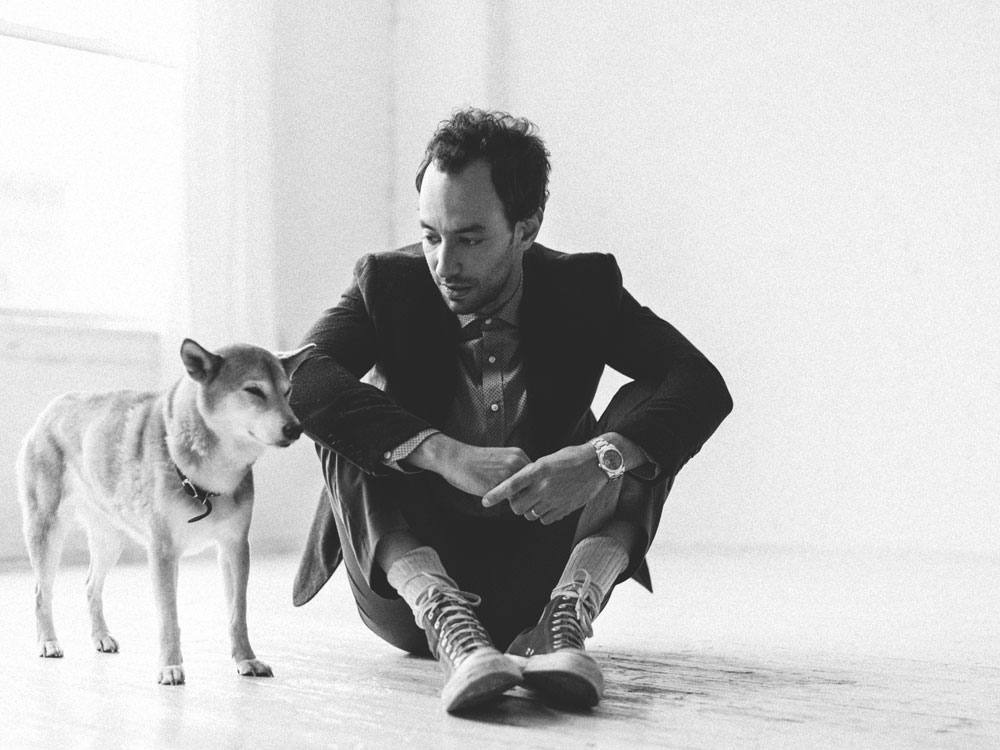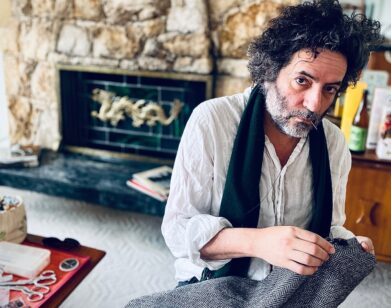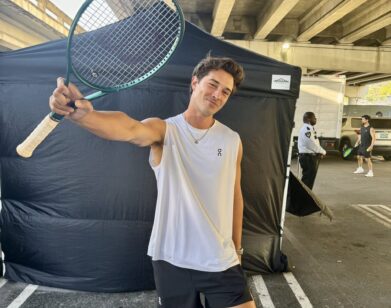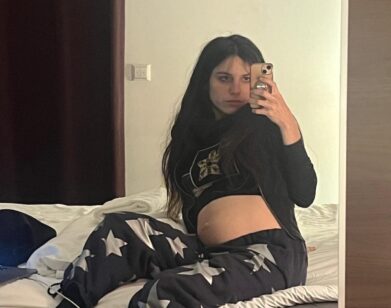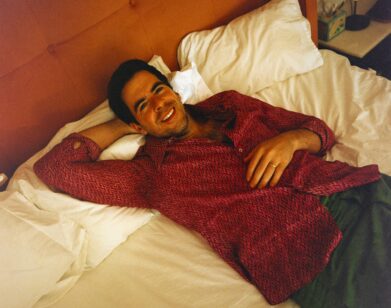Albert Hammond Jr.’s Marathon
ALBERT HAMMOND JR. IN NEW YORK, JULY 2015. PHOTOS: CHRISTOPHER GABELLO. STYLING: CHLOE HARTSTEIN. GROOMING: DAMIAN MONZILLO AT CELESTINE AGENCY USING SHU UEMURA HAIR AND MAC COSMETICS.
When you’re part of a band as beloved and iconic as the New York quintet The Strokes, releasing music on your own and creating an idiosyncratic sound is a daunting challenge. Fortunately, that hasn’t stopped anyone: singer Julian Casablancas is currently producing prog-punk with his band Julian Casablancas+The Voidz and drummer Fabrizio Moretti is performing under the name Little Joy. Guitarist Albert Hammond Jr. has also released three solo albums and an EP, but none so honed and well-crafted as today’s release, Momentary Masters.
Picking up where his 2013 four-track EP AHJ left off, Hammond Jr. dives further into his own thoughts, yet leaves the messages open for interpretation. The title of the album borrows its name from a quote in astronomer Carl Sagan’s book Pale Blue Dot: A Vision of the Human Future in Space, and also includes a cover of Bob Dylan’s “Don’t Think Twice, It’s Alright,” which reflects the musician’s growth and determination not to look back. In the last four years, Hammond Jr. admitted to serious cocaine, heroin, and ketamine addictions that cost him nearly $2,000 per week, entered rehab, and came out clean. He’s committed to remaining sober and last year moved out of New York City to his house in upstate New York where Momentary Masters was recorded.
In support of the album, Hammond Jr. is playing Lollapalooza this weekend and will appear on The Tonight Show on Monday. This September, the 35-year-old will embark on a four-month tour. Earlier this week, Hammond Jr. caught up with his close friend Colin Hanks, who is starring the CBS comedy Life in Pieces and whose documentary about the fall of Tower Records, All Things Must Pass, will open mid-October.
COLIN HANKS: What’s up buddy? How you doing?
ALBERT HAMMOND JR.: I’m good man, how’re you?
HANKS: Hanging in. Where are you?
HAMMOND: I’m in L.A.
HANKS: You mean all this could’ve been done in person?!
HAMMOND: Yeah! [both laugh] Where do you live in L.A.?
HANKS: I’m in Los Feliz.
HAMMOND: Alright. My parents have a place in Century City.
HANKS: You spend a lot of time at the mall?
HAMMOND: Oh yeah, I feel like a kid again.
HANKS: [laughs] Well, you know, staying with the parents has the tendency to do that.
HAMMOND: They’re not here, but I remember being, like, 12, and living at the Sherman Oaks Galleria.
HANKS: I got lost in the Sherman Oaks Galleria when I was a kid.
HAMMOND: You remember when it used to look like Fast Times at Ridgemont High?
HANKS: Yeah! And Commando. These are important cultural touchstones—well, one of them is. I can’t speak for Fast Times at Ridgemont High, but Commando is definitely in the zeitgeist to this day.
HAMMOND: Top of my list.
HANKS: I remember, it might have been a year ago, you and me texted a bit and you mentioned that you had a place in upstate New York. How long have you had that place? Is it like a little writer’s recording retreat for you? It sounds very bohemian and cool.
HAMMOND: [laughs] It’s home now. When I finished making this record I moved up there because I only spent, like, eight weeks last year in the city. It’s got a barn that has a studio, and it has a house right next to it—that’s home. I guess I found the land in 2008, and in 2009 it was done. Subconsciously, it’s been my saving grace.
HANKS: How did that change of scenery influence this particular record? That may be one of the lamest questions you’ve ever been asked, but keep in mind that I’m new at this “asking questions” thing.
HAMMOND: I don’t know so much if it’s the fact that it’s my home, as much as it is where it is. It has a tremendous vibe. Everyone who comes up just settles into it. It didn’t really feel like we were making a record—there were hard moments, don’t get me wrong, but I just felt like we were working in chunks and then hanging out. It was more like a summer camp vibe, but a summer camp that you had to paint the camp.
HANKS: You had to do work. We’re all adults now, but it was still fun. I remember about a year and a half ago, when I was shooting Fargo, and I texted you about that EP you had done.
HAMMOND: That was a very sweet text. [laughs] You were so sweet. You were like, “I just wanted to tell you, I’ve been listening to your EP. I’m up here filming Fargo, and I’m cold and it’s keeping me cozy.” Something like that.
HANKS: It definitely kept me cozy! You probably have an understanding of having to go on the road for long stretches of time. When you’re away from your family, your friends, your home, and your routine—or lack of routine, whatever that is—and you’re spending long amounts of time essentially just waiting, you end up latching on to certain things, and I’ve always been very personally latched on to music. For me, hearing is probably the strongest of the senses, because I sort of engrain a time in my life on what I was listening to. So that EP, along with a few other records, are very much like, “That was my time in Calgary, working on one particular project.” That was all you, you recorded all of that, right?
HAMMOND: That was all me. Gus and I were doing drum machine stuff and I was like, “Oh this sounds cool, let’s lay down some bass and we’ll get someone else to play it,” so the only thing we did was get an old friend of mine to record two of the songs on real drums upstate. Besides that, it was me playing the whole thing. I would not want to do that again. There was something fun about it, for sure, but I feel like what sparked this record and made it so exciting was having found these guys and playing in such an interesting way. It got me excited to see if we could make an album together.
HANKS: The EP and this record, which I’ve been absolutely devouring, feel like they build on each other. You’ve been making music for a long time now, and a lot of people, being around and making music, or acting, or whatever, have a tendency to be on this mad sprint, and then get tired out, or fall out. But with you, I feel that you’re much more interested in the marathon and the journey. Having this group of musicians play with you, but you ultimately being the driving force—how much of that is exciting to you? Are you comfortable now with where you’re at, but still kind of hungry?
HAMMOND: Some days you feel like, “We’re going to conquer the world” and other days it’s just “Ah, man, I quit.” [laughs] Like, “Really, what am I doing to myself?” But the band was a huge driving force. There was an extreme excitement that I had these few songs demoed, but then I had a full band that I could try songs with, opposed to my past records, [where] I would be making the arrangements by doing 15 demos. But, I also definitely feel like I sprinted and crashed. Now, obviously the dream would be to run the marathon and do it constantly, but you never know. If I think too far into that, then I just start to get super scared and anxious. Right now, where I am, I like the idea that I have this record that I’m going to play live; I feel very positive about what it takes to go and do something like that.
HANKS: Are you pumped to go out and start playing shows? What’s the rest of your year like? Nonstop, I would imagine.
HAMMOND: Dude, every step of the way, every day it gets closer, every piece of artwork, I get excited about the record. I can’t wait. I have September, October, November, and December booked; I’m doing eight weeks in America and one week in Japan in September/October. I come home for four days in November and then do four or five weeks in Europe, and then I have Christmas.
HANKS: Man. Holy shit.
HAMMOND: I’m not playing for Christmas—that’s just the holiday.
HANKS: I love the idea of you: “and then Christmas! I’m playing on Christmas! I’m playing Scranton on Christmas, it’s going to be great!”
HAMMOND: Oh god. I actually live 45 minutes from Scranton.
HANKS: So it’s a homecoming gig! That’s awesome!
HAMMOND: Come out to see me! [both laugh]
HANKS: So I have to ask, because this really popped out for me the first time I was listening to the record. The Dylan cover: does that song have a particular meaning to you that made you want to rework it? Or was it just, like, “a cool exercise”?
HAMMOND: [laughs] Maybe a little bit of both. Doing it created a meaning for me. The hardest thing for the Dylan song is finding a way for you to sing it so it feels like you, not take it too much from him, because there’s something about when he does it. It’s this fine balance and that’s what made it important to me. I was going through his songs to see if I could do a modern arrangement of one, and then I got this beat and the beginning of these different melodies, and I thought they sounded cool, opposed to those harmonica parts. When it starts you don’t think it’s that song…
HANKS: No, not at all. The first time I heard it, the music had started, it had my attention, and then all of a sudden the lyrics came and I was like, “Wait a minute! Is this…? No! It… it is!” It really does strike a very delicate balance between just straight-up covering a Dylan song, but also making the song unique. All covers are difficult in that way…You don’t want to go too straight-on, otherwise it’s just kind of like “What’s the point…”
HAMMOND: Half the charm is whoever’s singing it, and how they recorded is what you fell in love with. To do it too perfect, you’re never going to beat the original.
HANKS: No, a fact that Dylan also acknowledges because he covers his own songs; he never seemingly plays them the same way twice. To follow up on other things, and forgive me if this sounds strange, but it felt like you have grown incredibly comfortable with your own voice. Coming from a guitarist in one band and then fronting your own band, writing your own lyrics, and singing—that’s a big leap, and it’s one that you’ve been taking. This is your fourth record, but I feel like you’ve gotten more comfortable, not only in the actual projection of your voice, but the writing. Do you feel that that’s a fair assessment?
HAMMOND: For sure. I feel like I always describe myself as a late bloomer. My first album, in my mind, was that I had a few songs I needed to take from incomplete demos to working with someone else and finishing them. I never really wanted to tour it, but then I started touring and had to learn how to do it while everyone was watching and judging me. Then each part became a learning process. The second one, I had some great songs but I was unfocused because I was very high. But I still have some moments in there…
HANKS: They’re called moments of clarity, I believe.
HAMMOND: [laughs] That’s the purpose of creative stuff: when you really love what you do, you have to know at some point, or points, you’re not going to be good at it. That’s just the process of learning. I can edit it and try to be as perfect as I can, but I’m still going to have my vulnerable spots and my weaknesses. It’s about how you use those in your favor, which makes you unique.
HANKS: Let me ask another question, because this is one I’m constantly grappling with. In talking about the process, making mistakes, and being open with someone else, how much of that has come from growing up, having done it for so long, understanding that’s part of the process, and having more of those moments of clarity than maybe in the past?
HAMMOND: In my case, I’d have to say that having more of those moments of clarity, and stopping destroying myself definitely is the beginning of where I started to learn. My personality can be extreme in all ways, even in positive ways; I’ve learned that. But definitely, in my 20s when I look back, it’s almost like you said: I was running for no reason. It’s facing the reality of things, which is constant, it never ends, but sometimes is hard to do—”Oh shit, I’m that kind of person.”
HANKS: I remember reading something Roger Waters once said. He was always convinced like, “Oh, man I can’t wait for this to happen and once this happens my life will start,” and then he’s like, “No, your life started a long time ago.” [laughs] It’s started, and it’s going. It’s not stopping. It’s not ending any time soon. Your life already started, so don’t go thinking it’s going to start “once this happens.” You’ve been living it this whole time. [pauses] I didn’t mean to get so big and philosophical… Really, this is all a big preamble. We met around the time the first Strokes record came out [in 2001].
HAMMOND: It was in San Diego? With Jack Black?
HANKS: Yeah, Tenacious D was opening up for you guys. You guys love the D, as we all do. There’s a line in “Born Slippy” that for me really resonates a lot with the vibe of that [first Strokes] record, and it’s a real simple, very easy line: “There’s more of us than there are of them.” It reminded me of something from, shall we say, my youth, yet at the same time it still made me feel like I did when I was first listening to that record. Do you have similar moments when you’re listening or recording music, where you have that ability to time travel in your mind?
HAMMOND: For sure. I’ve reconnected to songs like, “Oh shit! Is that what it’s about?” Songs I know perfectly well, I’ll have a whole new connection, like “I can’t believe I’ve spent 10 years listening to this song not knowing that it was about this.” It doesn’t matter about being right or wrong; that feeling is stronger than right or wrong. It’s what happened to me when I fell in love with music: I remember being struck by things with just a gut feeling of deep love, where you’re like, “Oh what is happening to me!?” I even listened to my own songs the other day when I was going through something and I was like, “Is that what I meant?” [both laugh]
HANKS: The thing that’s so unique about songwriting is that there is no ingredient. It means so many different things to so many different people that you can just sort of say, “Dude, it’s about whatever you want it to be about!”
HAMMOND: That’s why I tried on this record to just give beams of things that have inspired me, in the sense that they continued my existence moving forward in a positive way. If I felt stuck, there’s different things that excited me and gave me curiosity, so I decided to mention those things opposed to trying to get into the meaning. I feel like having a conversation would be better than trying to explain what’s there. When you put on music, just feel it; it’s a different sense. I walk around with music in and it can just change my world in seconds.
HANKS: So what’s your week like with the record coming out?
HAMMOND: I’m doing Jimmy Fallon on Monday. It’s my first time doing the Tonight Show, and I think Meryl Streep’s going to be there.
HANKS: Well, you know…
HAMMOND: “I don’t like her.”
HANKS: No! She acts a mean monologue. I don’t know what that means; that doesn’t really mean anything. I was thinking about the new movie she’s in, Ricki and the Flash. I feel like all billboards now are like, “Get ready for Ricki!” and Ricki could be anything. Ricki could be a superhero; she could be Meryl Streep playing a guitar. We don’t know. We just have to be ready for her.
HAMMOND: Literally, a guitar.
HANKS: [laughs] Meryl Streep is literally a guitar.
HAMMOND: That would be an old Chevy Chase movie, wouldn’t it? Chevy Chase was the voice of the guitar.
HANKS: If Meryl Streep was the guitar, she would probably do a better “Stairway to Heaven” than Jimmy Page could, because Meryl Streep can do anything she wants. She’s pretty damn incredible. Well listen, dude, good luck with the record. It’s so good, I’m so happy for you, and I hope that it fuckin’ scratches all of your itches and does everything that it should. I’m very proud of you and very happy to have done this.
HAMMOND: And then this is when we would embrace.
HANKS: And then this is when we would embrace, if we had known we were in the same city.
MOMENTARY MASTERS IS OUT TODAY, JULY 31. FOR MORE ON ALBERT HAMMOND JR., VISIT HIS WEBSITE.

